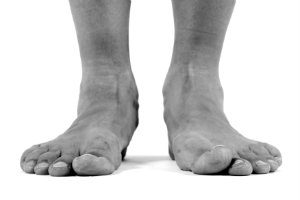


If you don’t have any issues with your feet, they simply do their job. However, understanding foot components and the roles they play—like when you spend time identifying your arch type—is useful for determining your risk factor for potential foot arch issues.
As we look at identifying foot arch issues, knowing which arch type you have is important. There are three types – moderate, low (flatfoot), and high (cavus foot). You can determine your style by examining your shoe wear patterns. Essentially, if you look at the bottoms of you r shoes and notice even wear, your arches are likely moderate in height. Excessive wear on the inner edge is a sign of low foot arches, whereas excessive wear on the outer edge can indicate high arches.
r shoes and notice even wear, your arches are likely moderate in height. Excessive wear on the inner edge is a sign of low foot arches, whereas excessive wear on the outer edge can indicate high arches.
The wet test is a matter of getting the bottom of your barefoot wet and then taking a normal step onto heavy paper or dry pavement. If your print consists of a front and back section connected by a strip about half the width of your foot, you have a moderate arch height. If the whole width is showing on the print, you have flat feet. On the other hand, a front and back connected by a thin strip, or even not connected at all, means your arch is high.
The importance of this in relation to identifying foot arch issues is that height plays a role in a biomechanical process known as pronation. Low foot arches lead to excessive roll and greater pressure on the inner edge of the foot. High arches cause supination (not enough roll) and the outer edge receives greater pressure.
Some foot arch issues are the problems caused by either being too low or too high, but sometimes the problem is what has caused the abnormal arch height in the first place. Weakened tissues in the feet—like the tendons, ligaments, and bones responsible for supporting the arch—can result in overuse injuries.
To address structural conditions and problems, we might prescribe custom orthotics. These are crafted to work specifically with your unique feet. Unlike over-the-counter shoe inserts, these prescribed devices are used in treatment for a medical issue. If you would like more information about this, or any of the services we provide at our Bloomington, IN podiatrist office, call (812) 333-4422 or use our online contact form today.